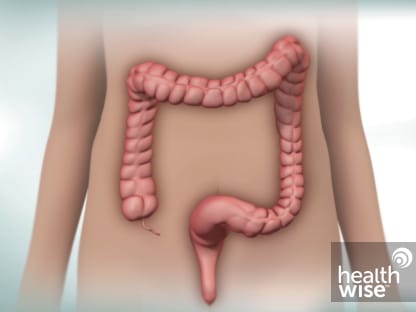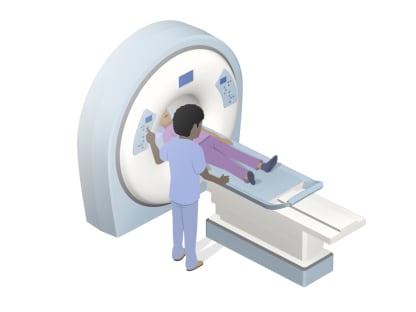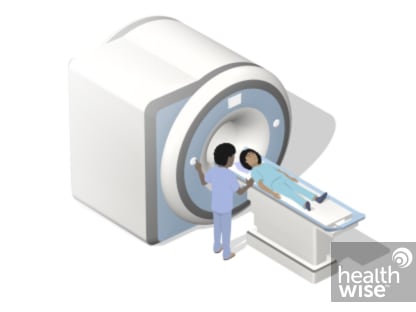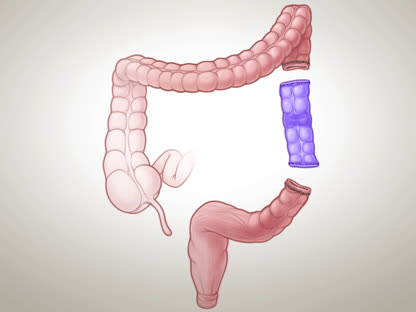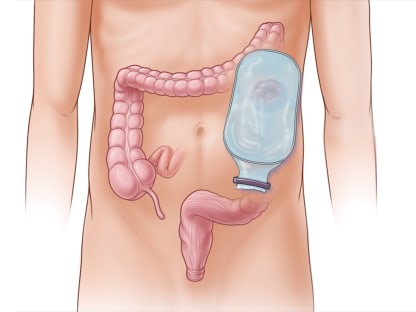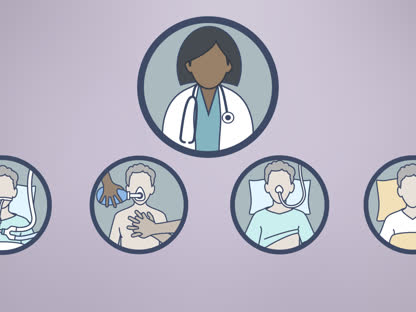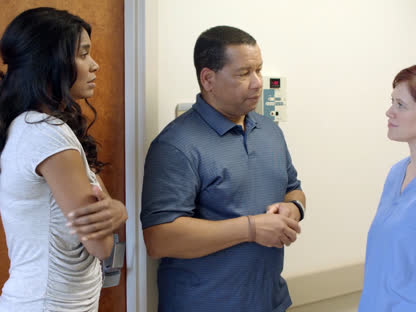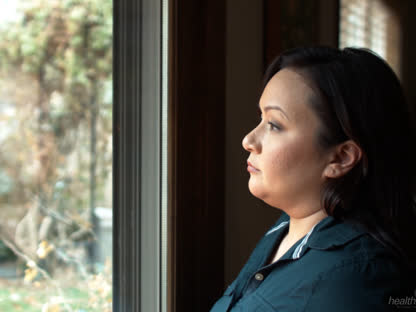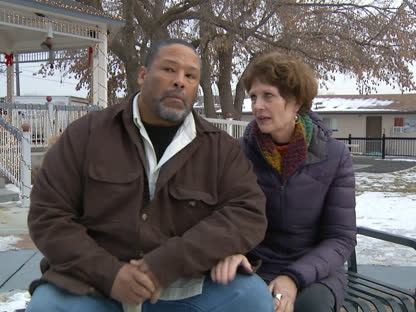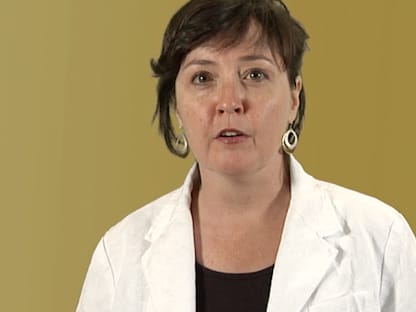Colorectal Cancer, Metastatic or Recurrent
Condition Basics
What is metastatic or recurrent colorectal cancer?
Metastatic cancer is cancer that has spread to other parts of the body. When colon or rectal cancer spreads, it most often spreads to the liver. Sometimes it spreads to the lungs, bones, or other organs in the body.
Colon and rectal cancers can return months or years after treatment. This is called recurrent cancer. If the original cancer was removed before it was able to spread, the chances that it will return are lower.
What causes it?
Doctors don't know the exact cause of metastatic or recurrent colorectal cancer. Sometimes cancer cells are too small to be found by tests. These cells may continue to grow and show up later as metastatic cancer, even years after treatment.
What are the symptoms?
Symptoms can include pain in the belly, blood in your stools, or more frequent bowel movements. If cancer spreads to the lungs, it can cause shortness of breath or cough. In the brain, it can cause headaches, seizures, dizziness, or confusion. If it spreads to the liver, it may cause jaundice or belly swelling.
How is it diagnosed?
Colon or rectal cancer that has spread or returned is diagnosed using a physical exam and several tests, including blood tests, chest X-rays, bone scans, ultrasounds, and CT, PET, or MRI scans. The diagnosis is usually confirmed with a biopsy.
How is metastatic or recurrent colorectal cancer treated?
Treatment for metastatic or recurrent colorectal cancer is based on many things. These include the location of the cancer, your overall health, and what matters to you. Surgery may be an option in some cases. Otherwise, the main treatments are chemotherapy, targeted therapy, and immunotherapy. A clinical trial may be a good choice.
Health Tools
Health Tools help you make wise health decisions or take action to improve your health.
Symptoms
The most common symptoms of metastatic or recurrent colorectal cancer are:
- A change in bowel habits, such as narrow stools or frequent diarrhea or constipation.
- Blood in the stool, or stools that look like black tar.
- Loss of appetite.
- Pain in the belly, especially gas pains, cramps, or a feeling of fullness.
- Unexplained weight loss.
- Constant tiredness (fatigue).
- Cough or shortness of breath.
- Headache or confusion.
Some people don't have any symptoms for some time.
If your cancer has spread, you may have other symptoms.
What Happens
Cancer is the growth of abnormal cells in the body. If the cancer keeps growing, over time it will spread farther.
Colorectal cancer often spreads first to nearby lymph nodes. From there, it may spread to the liver, lungs, or other places in the body.
Recurrent colorectal cancer occurs when the cancer begins to grow again months or years after treatment.
When To Call
Be sure to follow your doctor's instructions about calling when you have problems, new symptoms, or symptoms that get worse.
Call your doctor if you have:
- A change in bowel habits, such as constipation or diarrhea.
- Pain or bloating in your belly.
- Weight loss, loss of appetite, or severe tiredness.
- Persistent shortness of breath or cough (especially coughing up blood).
- Bone pain.
- Confusion or memory problems that get worse.
Exams and Tests
Colon or rectal cancer that has spread or returned is diagnosed using a physical exam and several tests, including:
- Abdominal ultrasound.
An abdominal ultrasound takes pictures of the organs and other structures in your upper belly. It uses sound waves to show images on a screen. It helps the doctor find the cause of pain or swelling in your belly.
- Colonoscopy.
A colonoscopy (say "koh-luh-NAW-skuh-pee") lets your doctor see if cancer has returned to your intestine.
- Blood tests.
These are done to find out if cancer has returned (carcinoembryonic antigen test, or CEA) or to find the cause of symptoms such as weakness, fatigue, fever, bruising, or weight loss (complete blood count).
- Chest X-ray.
A chest X-ray is a picture of the chest that shows your lungs and airway. It helps find the cause of symptoms such as persistent coughing, coughing up blood, chest pain, or trouble breathing.
- CT scan, MRI, or PET scan.
Images from these tests can help your doctor see if colorectal cancer has spread into the chest or organs in the belly or pelvis.
- Brain CT scan or MRI.
Images of the brain help look into symptoms such as confusion, paralysis, numbness, vision problems, vertigo, or headaches.
- Biopsy.
If imaging tests showed a mass in the liver or lung, a liver biopsy or a lung biopsy might be done.
- Bone scan.
This test helps your doctor find out if cancer cells have spread to the bones.
Learn more
Watch
Treatment Overview
Treatment for metastatic or recurrent colorectal cancer is based on many things. These include the location of the cancer, your overall health, and what matters to you. The main treatments are surgery, chemotherapy, or both. Other treatments may be used, such as targeted therapy or immunotherapy. If cancer has spread to the liver, you may have other options. Examples include thermal ablation and embolization. A clinical trial may be a good choice.
Your doctor will talk with you about your options and then make a treatment plan.
Some people use complementary therapies along with medical treatment. Therapies like acupuncture or massage may help you cope with the symptoms and stress of having cancer. Talk with your doctor about any of these options you would like to try.
Surgery
Surgery may be an option if the doctor thinks all of the cancer can be removed. You may have surgery to remove cancer in the colon or rectum. Or the doctor may remove cancer that has spread to the liver or lungs.
Sometimes surgery is done to relieve symptoms. For example, the doctor may create a colostomy to ease symptoms caused by a tumor that's blocking the colon. If you need a colostomy, you will get help from a nurse who specializes in ostomy care.
Chemotherapy and other medicines
Chemotherapy is the main treatment if surgery is not an option. These medicines kill fast-growing cells, including cancer cells and some normal cells. In some cases, the medicines are used to shrink a tumor before surgery. They may also be given after surgery to destroy any cancer cells that remain.
You may have testing to find out if the cancer has certain tumor markers (biomarkers). This can help your doctor choose the best chemotherapy medicines for you. It can also help the doctor know if other medicines may help. These include:
- Targeted therapy.
- These medicines target cancer cells and may cause less harm to normal cells. They help keep cancer from growing or spreading.
- Immunotherapy.
- This treatment helps your immune system fight cancer. It may be given in several ways.
Chemotherapy, targeted therapy, and immunotherapy may be given together.
These medicines are often put into a vein. Sometimes they are taken as a pill. The medicines travel through your body to kill cancer cells both inside and outside the bowel area.
Radiation therapy
This uses high-dose X-rays to destroy cancer cells and shrink tumors. It may be given during surgery or combined with chemotherapy (chemoradiation).
Radiation therapy may be used to shrink a tumor that's blocking the colon or rectum. It can also help relieve symptoms such as bleeding or pain.
Radiation therapy is often given by a machine outside the body (external radiation). It may also be given by placing substances inside the body (internal radiation, or brachytherapy).
Treatment for metastatic cancer in the liver
Sometimes surgery can remove colorectal cancer that has spread to the liver. But usually other treatments are needed. Other options include:
- Thermal ablation.
- This uses extreme cold or heat to destroy tumors. Cryosurgery (or cryotherapy) is a type of ablation that uses cold. Radiofrequency ablation uses heat.
- Embolization.
- This treatment uses tiny beads to block blood flow to a tumor. This help shrinks the tumor. The beads may give off radiation or chemotherapy. Or chemotherapy may be injected into the blood vessel before it's blocked.
- Chemotherapy.
- To treat tumors in the liver, chemotherapy may be given through a vein. Or the medicine may be put directly into an artery in the liver (intra-arterial chemotherapy).
- Radiation therapy.
- Radiation therapy may be given in different ways. One type is called stereotactic radiation therapy. It uses high doses of radiation focused right on the tumor. This helps to limit damage to normal tissues.
Clinical trials
Clinical trials are an option for many people who have colorectal cancer. These research studies test promising new treatments or improvements to existing treatments. People in clinical trials may have access to the latest treatments before they're available to others.
Your medical team can tell you if there's a clinical trial that might be right for you.
Learn more
Watch
Supportive Care
Palliative care is a type of care for people who have a serious illness. It's different from care to cure your illness, called curative treatment. Palliative care provides an extra layer of support that can improve your quality of life—not just in your body, but also in your mind and spirit. Sometimes palliative care is combined with curative treatment.
The kind of care you get depends on what you need. Your goals guide your care. You can get both palliative care and care to treat your illness. You don't have to choose one or the other.
Palliative care can help you manage symptoms, pain, or side effects from treatment. It may help you and those close to you better understand your illness, talk more openly about your feelings, or decide what treatment you want or don't want. It can also help you communicate better with your doctors, nurses, family, and friends.
End-of-life care
It can be hard to live with an illness that cannot be cured. But if your health is getting worse, you may want to make decisions about end-of-life care. Planning for the end of your life does not mean that you are giving up. It is a way to make sure that your wishes are met. Clearly stating your wishes can make it easier for your loved ones. Making plans while you are still able may also ease your mind and make your final days less stressful and more meaningful.
Learn more
Watch
Self-Care
There are things you can do at home to help manage the symptoms of cancer and the side effects of treatment. Your doctor may also give you medicines to help with certain side effects.
- Take your medicines exactly as prescribed. Call your doctor if you think you are having a problem with your medicine.
- Eat healthy food. If you do not feel like eating, try to eat food that has protein and extra calories to keep up your strength and prevent weight loss. Drink liquid meal replacements for extra calories and protein.
- Get some physical activity every day, but do not get too tired.
- Take steps to manage your stress, such as learning relaxation techniques. To also help reduce stress, get enough sleep, eat a healthy diet, and take time to do things you enjoy.
- Think about joining a support group. Or discuss your concerns with your doctor or a counselor.
Learn more
- Cancer: Controlling Cancer Pain
- Cancer: Controlling Nausea and Vomiting From Chemotherapy
- Cancer: Home Treatment for Constipation
- Cancer: Home Treatment for Diarrhea
- Cancer: Home Treatment for Fatigue
- Cancer: Home Treatment for Mouth Sores
- Cancer: Home Treatment for Pain
- Cancer: Home Treatment for Sleep Problems
- Cancer Support: Managing Stress
- Eating Well During Cancer Treatment
- Hair Loss From Cancer Treatment
Watch
Complementary Treatments
Some people use complementary therapies along with medical treatment. They may help relieve the symptoms and stress of cancer or the side effects of cancer treatment. Therapies that may be helpful include:
- Acupuncture to relieve pain and other symptoms.
- Meditation or yoga to relieve stress.
- Massage and biofeedback to reduce pain and tension.
- Breathing exercises to help you relax.
Talk with your doctor about any of these options you would like to try. And let your doctor know if you are already using any complementary therapies. They are not meant to take the place of standard medical treatment. But they may help you feel better and cope better with treatment.
Learn more
Watch
Getting Support
Relationships take on new importance when you're faced with cancer. Your family and friends can help support you. You may also want to look beyond those who are close to you.
- Reach out to your family and friends.
Remember that the people around you want to support you, and asking for help isn't a sign of weakness.
- Tell them how they can help.
Your friends and family want to help, but some of them may not know what to do. It may help to make a list. For example, you might ask them to:
- Run errands or pick up kids.
- Deliver meals or groceries to your home.
- Drive you to appointments.
- Go to doctor visits with you and take notes.
- Look for help from other sources.
Places to turn for support include:
- Counseling.
- Counseling can help you cope with cancer and the effect cancer is having on your life. Different types of counseling include family therapy, couples therapy, group counseling, and individual counseling.
- Your health care team.
- Your team should be supportive. Be open and honest about your fears and concerns. Your doctor can help you get the right medical treatments, including counseling.
- Spiritual or religious groups.
- These groups can provide comfort and may be able to help you find counseling or other social support services.
- Social groups.
- Social groups can help you meet new people and get involved in activities you enjoy. Focus on activities that bring you comfort, such as spending time outdoors or being with children.
- A cancer support group.
- Cancer support groups offer support and practical advice. You can hear others talk about:
- What it's like to live with cancer.
- Practical ways to manage your cancer treatment and its side effects.
- Ways to cope with your illness.
Learn more
Watch
Credits
Current as of: October 25, 2024
Author: Ignite Healthwise, LLC Staff
Clinical Review Board
All Ignite Healthwise, LLC education is reviewed by a team that includes physicians, nurses, advanced practitioners, registered dieticians, and other healthcare professionals.
Current as of: October 25, 2024
Author: Ignite Healthwise, LLC Staff
Clinical Review Board
All Ignite Healthwise, LLC education is reviewed by a team that includes physicians, nurses, advanced practitioners, registered dieticians, and other healthcare professionals.

